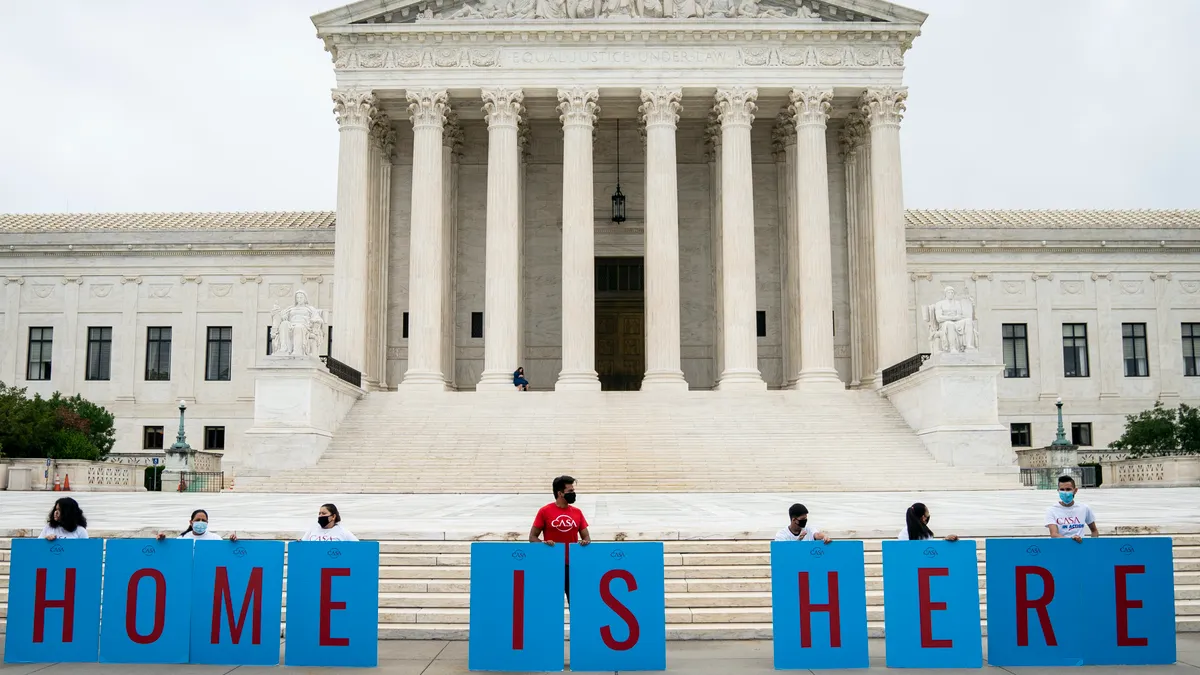Dive Brief:
- The Biden administration on Wednesday took a regulatory step intended to protect the Deferred Action for Childhood Arrivals program.
- The Department of Homeland Security released a 453-page final rule designed to protect DACA from legal challenges, which have plagued the program since its inception. The program, which provides protection from deportation to unauthorized immigrants who were brought to the country as children, has been unable to accept new applications since a federal judge ruled it unlawful over a year ago.
- The rule will formally replace a 2012 memo the Obama administration issued to create DACA. It is set to go into effect Oct. 31.
Dive Insight:
DACA and similar federal policies covering unauthorized immigrants have long been important to college leaders because they often protect current or prospective college students. Students covered by DACA cannot access federal financial aid programs, but they may qualify for in-state tuition or state financial aid programs.
The rule from DHS could make it a little harder to undo DACA. Still, it won't change the reality on campus for most college leaders, according to Jill Dunlap, senior director of research, policy, and civic engagement at NASPA, a higher education association for student affairs administrators.
"This is a great interim measure, but it's not where we ultimately need to be, which is legislation," Dunlap said. Without DACA becoming federal law, the program is working to protect unauthorized immigrants without having the legal foundation to protect itself, Dunlap said.
In a statement Wednesday, President Joe Biden called on Congress to pass legislation giving DACA recipients, all of whom have now lived in the U.S. for over a decade, a way to become permanent citizens.
"I will do everything within my power to protect Dreamers, but Congressional Republicans should stop blocking a bill that provides a pathway to citizenship for Dreamers. It is not only the right thing to do, it is also the smart thing to do for our economy and our communities," he said.
DACA recipients are often known as “Dreamers,” a term based on legislation called the DREAM Act.
Biden called this group part of the fabric of the U.S. Finalizing a rule governing the program bolsters benefits like authorization to work that allow DACA recipients to live freely, he said.
To be eligible for the program, unauthorized immigrants must have arrived in the U.S. before turning 16 and before June 15, 2007. They also must either be in school, have graduated from high school, have obtained a GED or have been honorably discharged from the Coast Guard or Armed Forces. As of March, DACA enrolled 611,270 immigrants, according to U.S. Citizenship and Immigration Services.
DACA has stagnated since it was first issued, according to Craig Lindwarm, government affairs vice president at the Association of Public and Land-grant Universities.
"In some ways, the program is frozen in time because the criteria have not changed. There are fewer and fewer undocumented youth who meet the criteria of having continuously resided in the United States since June 2007," Lindwarm said. "The more time that goes by without the ability to update and to more broadly include those who deserve the protections of DACA, the thinner the program is."
Causing it to grow thinner still is the DACA program's current inability to enroll new qualifying individuals.
In July 2021, a federal judge in Texas ruled DACA unlawful, saying the Obama administration violated the law by setting up the program through an executive order. Those already covered by DACA didn't face immediate consequences, but the ruling halted the government from approving new applications for the program.
The new DHS rule doesn't change that, Dunlap said.
"It's pending a federal appeals decision based in Texas, so I don't imagine campuses will see an influx of new applications from DACA students," she said.
Still, college leaders may find some value in reaching out to DACA-protected students who stopped out of class in the past few years, according to Dunlap. Such students may be more open to reengaging with higher education if they feel the DACA program is on more solid footing.
"Would we like to see a bigger win? Absolutely," Dunlap said. "But until we get legislation, I hope this brings some DACA students peace, knowing that they can continue their studies or maybe reengage if they've stopped out due to uncertainty about the future of the DACA program."














